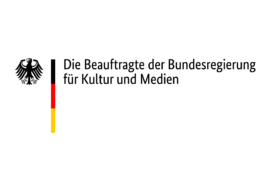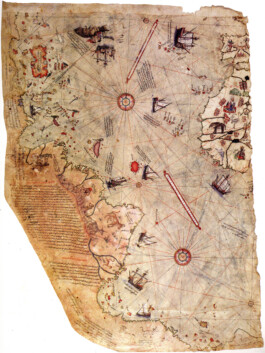¿Cómo se manifiesta el mito del “descubrimiento” de las Américas y qué repercusiones tiene en la actualidad?
Para este proyecto audiovisual de Karen Michelsen Castañón, el detonante fue un poema que su hija debía memorizar en una escuela estatal bilingüe de Berlín. El poema glorifica el “descubrimiento” de las Américas.
“No más poemas para Colón“ propone cortos con entrevistas a activistas, académicxs y profesorxs en Alemania y las Américas. Las conversaciones parten de la pregunta de cómo se re-escenifica la narrativa de 1492 - el año en el que Colón y una tripulación española invade Guanahaní - en su respectivo contexto social y cómo se conecta con el acontecer político actual.
How does the myth of the so-called “discovery” of the Americas manifest itself and affect us to this day?
Karen Michelsen Castañón’s “No more poems for Columbus” features excerpts of interviews with activists/scholars, social leaders, artists and teachers. All conversations start with the question of how the narrative of the “discovery” is reenacted in their specific territorial and educational contexts, and how this relates to current political events.
Her daughter, in a language class at a public bilingual school in Berlin, was supposed to memorize a poem glorifying the so-called “discovery” of the Americas. The audiovisual project “No more poems for Columbus” was prompted by this assignment.
Welche Erscheinungsformen und Auswirkungen hat der Mythos der “Entdeckung” der Amerikas heute?
Dieses audiovisuelle Projekt von Karen Michelsen Castañón wurde von einem Gedicht ausgelöst, den ihre Tochter in einer staatlichen, bilingualen Grundschule in Berlin auswendig lernen sollte. Das Gedicht glorifiziert die sogenannte “Entdeckung” der Amerikas.
In ”Keine Gedichte für Kolumbus” kommen Aktivist:innen, Akademiker:innen und Lehrer:innen in gefilmten Kurzinterviews in Deutschland und den Amerikas zu Wort und erzählen in eindrucksvoller Weise, wie das Jahr 1492 - das Jahr der Invasion Guanahanís durch Kolumbus und seiner spanischen Besatzung - im jeweiligen sozialen Umfeld neu inszeniert wird und wie dies mit aktuellen gesellschaftlichen Ereignissen in Zusammenhang steht.
Erstellung der Webseite gefördert von:



¿Cómo se manifiesta el mito del “descubrimiento” de las Américas y qué repercusiones tiene en la actualidad?
Para este proyecto audiovisual de Karen Michelsen Castañón, el detonante fue un poema que su hija debía memorizar en una escuela estatal bilingüe de Berlín. El poema glorifica el “descubrimiento” de las Américas.
“No más poemas para Colón“ propone cortos con entrevistas a activistas, académicxs y profesorxs en Alemania y las Américas. Las conversaciones parten de la pregunta de cómo se re-escenifica la narrativa de 1492 - el año en el que Colón y una tripulación española invade Guanahaní - en su respectivo contexto social y cómo se conecta con el acontecer político actual.
How does the myth of the so-called “discovery” of the Americas manifest itself and affect us to this day?
Karen Michelsen Castañón’s “No more poems for Columbus” features excerpts of interviews with activists/scholars, social leaders, artists and teachers. All conversations start with the question of how the narrative of the “discovery” is reenacted in their specific territorial and educational contexts, and how this relates to current political events.
Her daughter, in a language class at a public bilingual school in Berlin, was supposed to memorize a poem glorifying the so-called “discovery” of the Americas. The audiovisual project “No more poems for Columbus” was prompted by this assignment.
Welche Erscheinungsformen und Auswirkungen hat der Mythos der “Entdeckung” der Amerikas heute?
Dieses audiovisuelle Projekt von Karen Michelsen Castañón wurde von einem Gedicht ausgelöst, den ihre Tochter in einer staatlichen, bilingualen Grundschule in Berlin auswendig lernen sollte. Das Gedicht glorifiziert die sogenannte “Entdeckung” der Amerikas.
In ”Keine Gedichte für Kolumbus” kommen Aktivist:innen, Akademiker:innen und Lehrer:innen in gefilmten Kurzinterviews in Deutschland und den Amerikas zu Wort und erzählen in eindrucksvoller Weise, wie das Jahr 1492 - das Jahr der Invasion Guanahanís durch Kolumbus und seiner spanischen Besatzung - im jeweiligen sozialen Umfeld neu inszeniert wird und wie dies mit aktuellen gesellschaftlichen Ereignissen in Zusammenhang steht.
